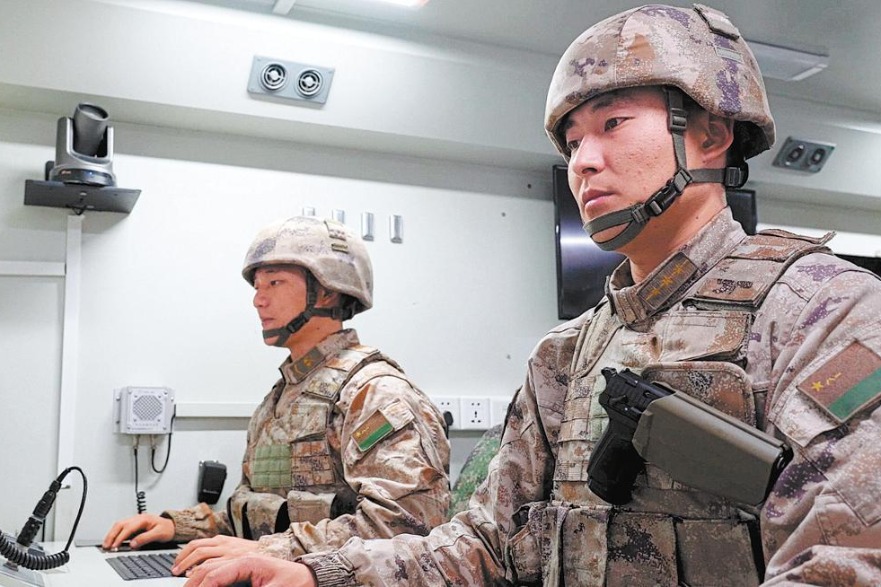Foreign-friendly skies





|

Roy Weinberg, who used to fly with US Airways, is one of many pilots who now call China home. [Gao Erqiang / China Daily ] |
Airline pilots are finding that china is a great place to spread their wings
After spending much of his career with the same airline, Roy Weinberg found himself bored. So, about a year ago, the 48-year-old gave up his job with US Airways, moved to Shanghai and became a captain for China's Spring Airlines.
"I've been doing the same job for 20 years and have another 15 years to go," says Weinberg, who first made the move alone and then brought the four other members of his family with him. "I said to myself, 'It's too boring. Let's go to do something (else) for a few years and then come back'."
He is not the only one who has made such a change in the pursuit of new experiences. Many of the friends at the airlines where he had previously worked are now flying for Chinese airlines in Chengdu and Beijing, he says.
The companies, he says, have a strong demand for foreign pilots, especially younger ones. Spring Airlines, for example, employs a team of 30 foreign pilots, and Hainan Airlines has 46.
By the beginning of 2011, China was home to at least 1,300 foreign flight captains, according to Li Jiaxiang, director of the Civil Aviation Administration of China.
With the expansion of Chinese airlines, a serious shortage of talent has arisen. By 2015, China's aviation industry is expected to need 18,000 more pilots, according to China Business News.
"One of the chief reasons why we are desperate for foreign pilots lies in the long amount of time it takes to prepare our own pilots," says Zhang Wu'an, spokesman for Spring Airlines. Training a flight captain in China takes about 10 years, he says. "The quickest way to supply our needs turned out to be to hire foreign pilots."
When Air China Cargo, an independent company whose chief stakeholder is Air China, was faced with a shortage of flight captains, the company quickly began to recruit foreigners, says Zou Peng, vice-president of the company's flight operations division.
At a time when more and more air cargo is being transported in China, planes keep being added to Air China's fleet and the demand for flight personnel continues to increase as a result. In 2006, the company recruited eight foreign captains.
This May, Air China Cargo went through an ownership restructuring. Cathay Pacific Airways now holds 49 percent of the company's shares, a change that came about after it agreed to provide Air China Cargo with four Boeing 747-400 planes. Two of those aircraft arrived this year and another two will come in 2012.
Between 2009 and 2010, when a group of Chinese flight captains retired, the company found itself without enough personnel to fly the planes. Its demand for foreign workers increased accordingly.
China's system for training pilots requires students to go through at least 12 years of training to become a captain permitted to fly a wide-body plane such as a Boeing 747 or 777, Zou says.
"Even if we had begun to train pilots since 2003, when the company was founded, we still would not have many captains as we need," he says.
So Air China Cargo goes out looking for pilots from other countries. During the recent economic downturn, airlines in Japan, the US and other places cut jobs, giving Chinese airlines an opportunity to recruit large numbers of personnel.
Without much trouble, Air China Cargo signed contracts with nearly 40 airline captains from 14 countries and regions, including Japan, South Korea, Europe and South America. Now 59 foreign captains work for the airline, making up 50 percent of the captains and 25 percent of the pilots there. The company plans to keep expanding its fleet in the next four years and eventually hire as many as 120 foreign captains, Zou says.
Because of the need for pilots, Chinese companies are willing to pay foreign airline captains "more than what they're worth", Weinberg says.
According to Zhang Wu'an, spokesman for Spring Airlines, the airline offers foreign pilots from $150,000 (110,920 euros) to $160,000 a year after taxes. The salaries of Chinese pilots, in contrast, usually only come to between $93,250 and $108,800 a year.
Japanese and South Korean airline captains find their after-tax earnings in China are higher than they would be in their home countries, Zou says.
"Foreigners are willing to come (to China) in part because they believe there will continue to be a strong demand here for air transport, which will give them a stable job," he continues.
Zou says foreigners are valued because they can help Chinese pilots learn more about international flight routes and English.
"Even if we have enough Chinese captains one day, foreign captains are still likely to account for 20 percent of the total (we employ)," he says. "Such a composition will help to improve the whole team."
In the US and most of the Western world, the oldest pilots and those with the most seniority at a particular airline are given the greatest amount of leeway to pick their own schedules, Weinberg says. That system used to be a cause of annoyance to many of his younger friends who now fly for Chinese airlines.
Chinese airlines prefer to hire young pilots, in part because the country's retirement age in that profession is 60, five years in advance of what the age is in most other places in the world. The youngest foreign captains at Spring Airlines are in their 30s, says Xiao Fei, who works for the airlines' foreign pilot and student pilot management office.
Despite the increasing number of foreign pilots in China, the public had not paid much attention to them until a recent incident involving a South Korean caught its notice.
On Aug 13, the captain of a Juneyao Airlines flight ignored instructions coming from air traffic controllers at Shanghai Hongqiao airport and refused to delay her own landing to give another aircraft time to make an emergency touchdown. The pilots of both planes said they were about to run out of fuel.
But an investigation by the Civil Aviation Administration of China found that the Juneyao Airbus 320-200 contained enough fuel to stay in the air for another 42 minutes, while the Qatar Airways Boeing 777-300ER could only remain in flight for 18 minutes.
The captain of the Juneyao flight was banned from continuing to work as a pilot in China. Among other punishments, the company is now prohibited from pursuing its expansion plans or hiring foreigners.
Weinberg says the incident should be taken as a sign that China should improve the system it uses to ensure the safety of passengers and flight crews, rather than simply as something the captain should be punished for.
"This incident is a perfect example to show that more than one person needs to take responsibility," he says.
"There were lots of things that happened that created the situation. It wasn't one person making one decision at one time. It was a large event. In China, a captain is always the one who gets in trouble, while in America, everybody takes responsibility."
Zhang Qihuai, an aviation law expert with the Beijing-based Lan Peng Law Firm, later said that "language turned out to be one of the chief causes of the incident".
Even though English has been designated as the official language to be used in communications about international flights, as well as flights to Beijing, Shanghai and Guangzhou in China, Xiao Fei says air controllers still speak Chinese to foreign pilots during peak flight hours.
"What happened to me many times is that everybody around me is getting commands in Chinese, and I'm the only English-speaking (pilot) in the air," Weinberg says. "They speak to me in English, but speak to everybody else in Chinese. I don't know what's happening since I don't know what other airplanes around me are doing."
If even one pilot is speaking English on airline radios, air traffic controllers should speak English to everyone else who is flying nearby, he says.
To prevent an incident like the one involving the South Korean from occurring, he says China should review the system it uses to ensure safety of air flights.
Today's Top News
- PLA fully capable of crushing secessionist attempts
- China holds central rural work conference
- President Xi to deliver New Year's message to ring in 2026
- Xi's diplomacy in 2025: Shedding light on a world at crossroads
- FTP has given Sanya a complete makeover
- China to apply lower import tariff rates to unleash market potential


























